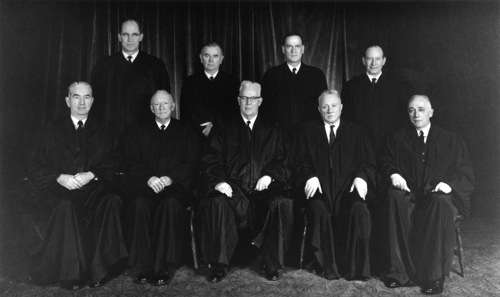The Volokh Conspiracy
Mostly law professors | Sometimes contrarian | Often libertarian | Always independent
Today in Supreme Court History: February 28, 1966
Editor's Note: We invite comments and request that they be civil and on-topic. We do not moderate or assume any responsibility for comments, which are owned by the readers who post them. Comments do not represent the views of Reason.com or Reason Foundation. We reserve the right to delete any comment for any reason at any time. Comments may only be edited within 5 minutes of posting. Report abuses.
Please to post comments



As a retired federal agent, I have a real-life understanding of the formidable power the state can have over an individual.
The three most trying situations I faced were:
1. Handcuffing a person
2. Reading them their Miranda rights
3. Searching their residence
Each of these has a direct connection to their liberty with 1 and 3 having immediate and significant impacts on their unalienable Rights [including] Life, Liberty, and [their] Pursuit of Happiness.
Indeed!
So did Warren, who wrote the opinion, and Black and Douglas, who joined in. All had come to prominence as prosecutors.
Setting aside whether you think Miranda was correct as a faithful interpretation of the Constitution, in your experience as an agent did it have practical benefits? To suspects? To agents themselves?
He was an inspector with the Dept. of Fish & Wildlife Services inspecting imports for unlicensed trafficking of gibbons and other various apes (hence his nom de cyber). It’s not like he was Elliot Ness or Charles Winstead battling Crime, Inc.
HA! That's pretty good.
Wrong but good.
Just ask all the people laid out on autopsy tables, rape victims, and the murder/rape/other felony suspects I had the chance to meet.
BTW, if any of you ever have a chance to attend an autopsy you have to go or at least watch a (professional) video.
It's absolutely awesome (from a technical aspect not gory), how the human body is built.
The stories are incredible: cutting open skulls, weighing brains, removing testicles - from INSIDE the body cavity, etc.
From a legal aspect I don't think there is much of a benefit.
People sort of already know if they're going to talk or not.
One practical benefit for the suspect is they now know what exactly we're investigating.
"I'm investigating the murder of Sonny Corleone of which you are suspected. You have the right to remain silent. . . ."
So now the person knows we're investigating a particular murder and not another murder or crime.
I can't find the source now, but I've read that several years later, when "Miranda warnings" had become a common phrase, Ernesto Miranda got himself into some new legal trouble, and the potential jurors were told he was that Ernesto Miranda and asked if they would hold that against him.
apedad, have you ever run across something I've seen a few times: a cop taking a suspect into custody, the suspect yelling "You didn't read me my rights," and the cop replying: "I haven't asked you anything yet, a*****e"?
Interestingly, Miranda reaffirmed what had already happened in the common law, at least in Britain.
See the Dickens novel "Our Mutual Friend" (1865):
"It’s my duty to inform you that whatever you say, will be used against you." (The Inspector to John Rokesmith, Book the Fourth, Chapter 12.)
On the other hand (if I understand British law properly, which I may not), not answering questions could also be used against you.
A good idea or not (I'm for) -- a requirement is NOT in the constitution.
When you give them power to make up good things, they will use that power to make up BAD things.
“Evolving standards of decency.” Currently backsliding, but “the arc of history bends towards justice.”
Cue the Conspirator who complains about how bad the Miranda decision is . . .
at this "often libertarian" blog.
There's a great moment about 18 minutes in when Potter Stewart asks counsel what the advice should be, and counsel basically recites what becomes the famous text.